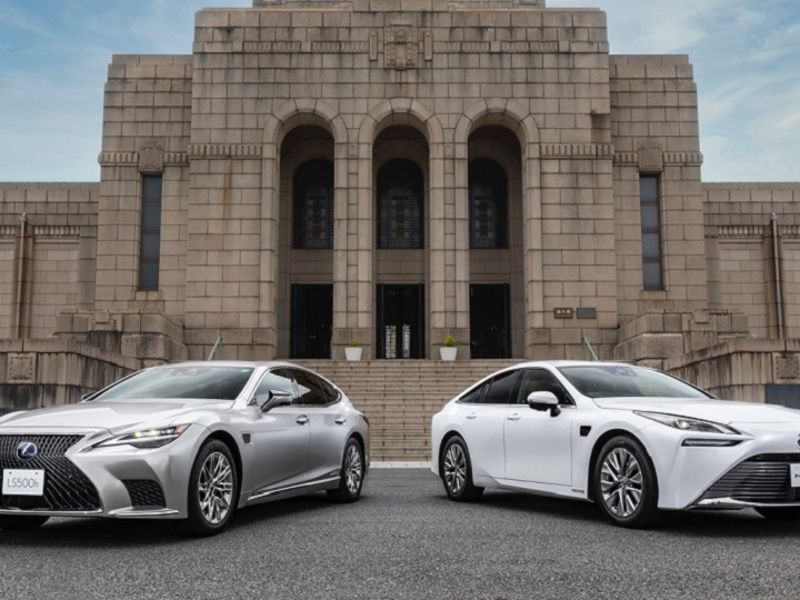
TOKYO – Toyota has begun selling its most advance automated driving system to date in a refreshed Lexus LS sedan and will soon expand deployment to the Mirai fuel cell vehicle, rolling out a Level 2 system that uses a lidar sensor, machine learning and over-the-air updates.
The setup, called Advanced Drive, will allow the cars to automatically change lanes and pass other vehicles in highway driving, Toyota Motor Corp. said in a news release on Thursday.
The technology debuted April 8 for the Japan market in a special grade of the Lexus LS500h sedan. It will next be offered in the Mirai, when that sedan goes on sale in Japan on April 12.
In the top-line Lexus LS500h model, the Advance Drive package adds about 660,000 yen ($6,000) to the sticker, boosting the price to 17,940,000 yen ($163,400), including tax.
It costs about $5,000 extra in the Mirai.
Toyota said last July the system would go to market by the end of 2020. But the introduction took longer partly due to delays in real-world testing created by the COVID-19 pandemic.
For the time being, the new technology will be available only for the Japanese market, where it is tuned to Japanese maps, driving habits and regulations. But the software was designed to work globally, and Toyota is considering deployment to other markets, such as the United States.
The rollout furthers Toyota’s bid to catch competitors, especially in the luxury segment, that have been more aggressive in introducing self-driving vehicles. But Toyota says it is prioritizing customer safety in a slow but steady approach as it develops a software architecture.
Toyota has steered clear of labeling its system self-driving or autonomous. Toyota instead calls its systems automated, a nod to the system’s reliance on human interaction. The new Advanced Drive package was developed under the Mobility Teammate concept Toyota has been working on for years. It’s called Toyota Teammate at Toyota and Lexus Teammate at the premium brand.
The system uses lidar, cameras, radar and high-precision maps to help it drive. Machine learning is leveraged to help monitor and makes sense of the car’s surroundings. It also incorporates the ability for over-the-air updates to easily add new functionality to the car after purchase.
A camera also monitors the driver to make sure the person behind the wheel is attentive and ready to take over if necessary. The system requires such confirmation in order to execute certain functions, such as lane changing. The driver must also hold the wheel while changing lanes.
The driver-monitoring camera is supplied by Toyota Group supplier Aisin Corp.
The new system will be able to navigate a series of highway driving scenarios, including keeping the vehicle in its lane, maintaining vehicle-to-vehicle distance, lane splits, changing lanes and overtaking other vehicles. It also features an automated parking assist that supports steering, braking, acceleration and gear changing to help guide the car, with a bird’s-eye view display.
Denso Corp., also of the Toyota Group, already supplies the forward radar, forward stereo camera and electronic control unit found in the previous Lexus Safety System+. For Advanced Drive, Denso also supplies one more sensor and an additional ECU.
Chipmakers Nvidia and Renesas also supply processing power for Toyota’s new system.
The new models are Toyota’s first products brought to the market that provide over-the-air updates and utilize AI technology centered on deep learning, said Toyota executive James Kuffner, who is also the head of Toyota’s research unit Woven Planet.
“This is really an important first step in our journey towards software-first development,” he said at an online briefing on Thursday, adding that the company has tried to design the software to be truly global and to provide re-usability.
In the future, software features on cars will be “upgradable” and “more customizable” much like how people personalize their smartphones, Kuffner said.
Fully self-driven cars are still likely to be years away, but General Motors early this year made a splash at the virtual Consumer Electronics Show with a fully-autonomous all-electric flying Cadillac concept, while Chinese search engine operator Baidu unveiled a partnership with local car brand Geely.
Toyota’s domestic competitor, Honda, last month unveiled a partially self-driving Legend sedan in Japan, becoming the world’s first carmaker to sell a vehicle equipped with new, certified level 3 automation technology.
Reuters contributed to this report

